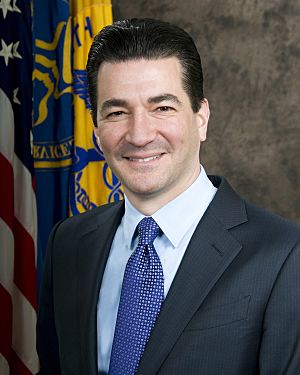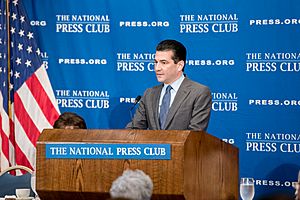Scott Gottlieb facts for kids
Quick facts for kids
Scott Gottlieb
|
|
|---|---|

Gottlieb in 2017
|
|
| 23rd Commissioner of Food and Drugs | |
| In office May 11, 2017 – April 5, 2019 |
|
| President | Donald Trump |
| Deputy | Anna Abram |
| Preceded by | Robert Califf |
| Succeeded by | Norman Sharpless |
| Personal details | |
| Born | June 11, 1972 East Brunswick, New Jersey, U.S. |
| Political party | Republican |
| Education | Wesleyan University (BA) Mount Sinai School of Medicine (MD) |
Scott Gottlieb (born June 11, 1972) is an American physician and investor. He was the 23rd leader of the Food and Drug Administration (FDA). This important role lasted from May 2017 to April 2019.
Today, he is a senior expert at the American Enterprise Institute (AEI). He is also a partner at a company called New Enterprise Associates (NEA). Gottlieb serves on the boards of drug maker Pfizer, Inc and gene company Illumina, Inc.. He also shares his knowledge on CNBC and CBS News' Face the Nation.
Gottlieb is a member of the National Academy of Medicine. He wrote Uncontrolled Spread, a best-selling book about the COVID-19 pandemic. This book looked at how the pandemic showed weaknesses in national safety. His next book, The Miracle Century, will explore new cell therapies.
Before leading the FDA, he taught at New York University Grossman School of Medicine. He was also the FDA's Deputy Commissioner for Medical and Scientific Affairs. He worked with New Enterprise Associates from 2007 to 2017. He also helped guide the Leukemia & Lymphoma Society.
Contents
Scott Gottlieb's Early Life and Education
Scott Gottlieb grew up in East Brunswick, New Jersey. His father, Stanley, is a psychiatrist. Gottlieb earned his first degree in economics from Wesleyan University.
After college, he worked as a healthcare analyst. This job was at an investment bank called Alex. Brown & Sons. Gottlieb then went to medical school at Icahn School of Medicine at Mount Sinai. He finished his medical training in internal medicine at Mount Sinai Hospital. He is Jewish.
Scott Gottlieb's Career Journey
Scott Gottlieb has worked in both government and private companies. He has helped shape healthcare policies in the U.S.
Working at the FDA and CMS (2003–2007)
Gottlieb worked for the U.S. Food and Drug Administration (FDA) twice. First from 2002 to 2003, then from 2005 to 2007. He started as an advisor to the FDA Commissioner. Later, he became the Director of Medical Policy Development.
He helped create programs for generic drugs and new rules for drug labels. He also worked on policies for HIV/AIDS drugs under the PEPFAR program. In 2003, he moved to the Centers for Medicare & Medicaid Services (CMS). There, he helped put the new Medicare Part D drug benefit into action.
Gottlieb returned to the FDA from 2005 to 2007. He became the Deputy Commissioner for Medical and Scientific Affairs. He helped plan for U.S. biodefense and prepare for pandemics. He also worked on rules for generic drugs and drug labeling.
Working in Private Companies (2007–2017)
Gottlieb also practiced internal medicine at New York University's Tisch Hospital. In 2007, he joined New Enterprise Associates (NEA). This is a large company that invests in new businesses.
He helped invest in healthcare companies for NEA. He was on the boards of companies like Bravo Health. Gottlieb stayed at NEA until he became FDA Commissioner in 2017.
In 2016, Gottlieb spoke to the U.S. Congress. He talked about how the FDA regulates drug prices. He also discussed healthcare reform and new medical ideas. He argued that too many rules made it hard to create new generic drugs. This included complex drugs like the EpiPen.
He believed these rules stopped competition and kept costs high. Gottlieb also served on the boards of other companies. These included Tolero Pharmaceuticals and Daiichi Sankyo Inc. He was also an advisor to GlaxoSmithKline.
Leading the FDA as Commissioner (2017–2019)
Scott Gottlieb advised Donald Trump's presidential campaign in 2016. He then joined Trump's transition team. In March 2017, he was chosen to be the FDA Commissioner.
He promised to avoid decisions involving companies he had worked with. The Senate approved him on May 9, 2017. He was sworn in on May 11, 2017.
As Commissioner, Gottlieb was known for working well with others. He approved the first gene therapy in the U.S. in August 2017. He also started new rules for homeopathic drugs.
In May 2018, Gottlieb took action against stem cell companies. He asked courts to stop two companies after patients were harmed. He also set new rules for how the FDA would enforce its policies.
Gottlieb worked to make it easier to approve complex generic drugs. In August 2018, the FDA approved the first generic EpiPen. In January 2019, they approved a generic version of the asthma drug Advair. Many of the generic drugs approved in 2018 were "complex generic drugs."
In November 2018, the FDA worked with the Department of Defense. They created a plan to speed up medical products for soldiers. Gottlieb fought to keep the FDA in charge of reviewing these products.
Gottlieb also worked on drug pricing. In December 2018, he announced a plan for insulin. He wanted insulin to be regulated differently. This would allow more competition and lower costs.
In February 2019, Gottlieb stopped the sale of some dietary supplements. These supplements made false claims about treating Alzheimer's disease. He also proposed new rules to improve FDA oversight of supplements.
He also created a new plan for medical devices that use artificial intelligence. This plan aimed to help these new products reach the market safely. In March 2019, Gottlieb pushed for some cosmetics to be removed from stores. These products contained asbestos. He also suggested new ways to oversee the cosmetics industry.
On March 5, 2019, Gottlieb announced he would resign. He said he wanted to spend more time with his family. Many people praised his work at the FDA. He was seen as an active leader who tackled many issues.
He also introduced a new rule in March 2019. This rule required mammogram centers to tell women if they have dense breast tissue. This was the first change to mammography rules in 20 years.
While leading the FDA, Gottlieb expanded inspections at international mail centers. He hired more staff to check suspicious packages. He also worked with Customs and Border Protection for joint inspections.
Working in Private Companies Again (2019–Present)
After leaving the FDA, Gottlieb returned to the American Enterprise Institute. In May 2019, he rejoined New Enterprise Associates. He helps lead investments in healthcare companies.
He also joined the boards of Pfizer, Inc. and Illumina, Inc. He is a member of the boards of trustees for the Mount Sinai Health System and Wesleyan University. Gottlieb often writes for the Journal of the American Medical Association's Health Forum.
During the COVID-19 pandemic, Gottlieb shared a lot of public information. He testified before the Senate in February 2020 about preparing for the virus. In March 2020, he helped write a plan for reopening the country.
Since April 2020, Gottlieb has advised several governors on COVID-19. He joined response teams for Maryland, Massachusetts, and Connecticut. In November 2020, he joined Montana's COVID-19 task force.
Other Professional Activities
Gottlieb has been involved in many other professional groups. He was on the Public Policy Committee for the Society of Hospital Medicine. He also advised the National Comprehensive Cancer Network. He is a member of the advisory board for the Milken Institute's FasterCures. Before his government roles, he was a fellow at the American Enterprise Institute.
Writing and Publications
Gottlieb has written for many important publications. He was a staff writer for the British Medical Journal (The BMJ). He was also a senior editor for the Journal of the American Medical Association (JAMA).
He regularly writes for The Wall Street Journal and The Washington Post. He used to write for Forbes. Many of his articles discuss how public policy and medicine connect.
In January 2020, Gottlieb wrote several articles warning about COVID-19. He wrote an opinion piece in The Washington Post about preparing for the virus. He also wrote for The Wall Street Journal about preventing an American epidemic.
His book, Uncontrolled Spread, looks at how the U.S. responded to the COVID-19 pandemic. The book was released in September 2021. It became a New York Times and The Wall Street Journal best seller.
Awards and Recognition
Scott Gottlieb has received many awards for his work.
- Fortune magazine named him one of "The World's 50 Greatest Leaders" in 2018 (ranking 6th) and 2019 (ranking 50th).
- Time magazine named him one of its "50 People Transforming Healthcare in 2018."
- Politico named him one of its "50 Politicos for 2018."
- Modern Healthcare named him the "Most Influential Physician Executive and Leader" in 2018 and 2019.
- He was elected a member of the National Academy of Medicine in October 2018.
- The American Medical Association gave him the 2019 Dr. Nathan Davis Award.
- He received the Cancer Research Leadership Award in September 2019.
- Modern Healthcare recognized him on its list of 50 Most Influential Clinical Executives for 2020.
- Medical Marketing & Media (MM&M) and PRWeek ranked him number 4 on their 2020 Health Influencer 50 list.
- Washingtonian named him one of "Washington's 2021 Most Influential People."
- In May 2021, he received an honorary Doctor of Science degree from Wesleyan University.
- He was inducted into the East Brunswick High School "Hall of Fame" in 2022.
- Mediaite ranked him number 24 on their Most Influential in News Media 2021 list.
- He was named one of Washington, D.C.'s 500 Most Influential People Shaping Policy in 2022 and 2023 by Washingtonian.
- FiercePharma named him one of "The 22 most influential people in the fight against COVID-19."
- He received The Mount Sinai School of Medicine Alumni Special Recognition Award in 2024.
Scott Gottlieb's Personal Life
Scott Gottlieb survived Hodgkin lymphoma, a type of cancer. He is married and has three daughters.


